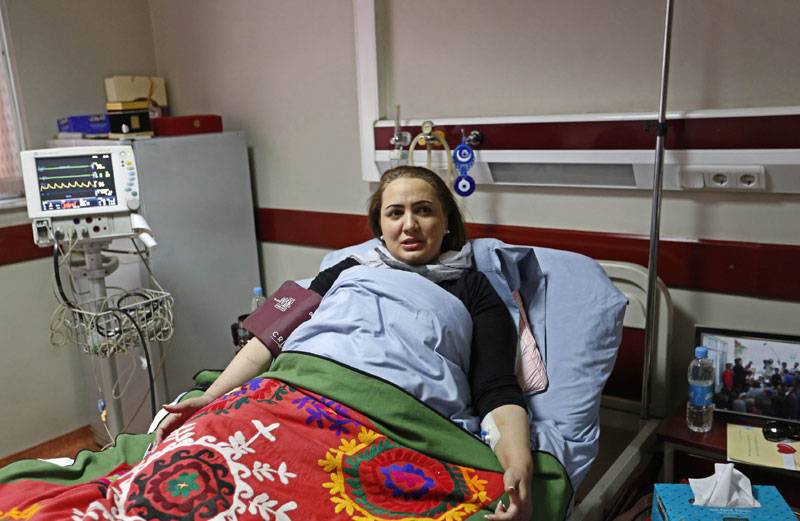JESSICA DONATI - No one ever claimed responsibility after a suicide bomber rammed into the vehicle of celebrated female parliamentarian Shukria Barakzai. She walked away from the wreckage after the Nov. 16 blast that killed three civilians and wounded 20.
The Taliban often take responsibility for suicide bombings. They did so for one against the British embassy that killed six people days later. Barakzai, 42, said Afghanistan’s spy agency had warned her before about threats to her life from the insurgents. But an investigation into the attack on the outspoken women’s rights activist has led nowhere.
Barakzai has no shortage of potential enemies, including powerful warlords.
“Our Parliament is a collection of lords,” Barakzai once famously said. “Warlords, drug lords, crime lords.”
Barakzai was only a few hundred metres from the Parliament building, her destination, when the suicide bomber rammed into her armoured car.
A strong supporter of new President Ashraf Ghani, Barakzai had been talked about as a candidate to join his government, perhaps as education or women’s affairs minister. Ghani has promised he will appoint four women to his cabinet.
Barakzai, who rose to prominence when she ran underground schools for girls when the Taliban ruled the country, says both the previous Afghan government and its Western benefactors have failed to defend the hard-won rights of women.
“For me, what they do to support women’s rights is just lip service, nothing more than that,” says Barakzai, interviewed in hospital where she was recovering from burns to the left side of her face and her left hand from the attack.
QUOTAS FOR WOMEN
The US-led coalition invaded Afghanistan in 2001 to oust the Taliban, and stayed on, in part to build a Western-style democracy, including legal safeguards for women. A quota was mandated for women in public offices, such as parliament and provincial councils. Earlier this year, however, conservative lawmakers rolled back the quota for women in provincial councils to 20 per cent from 25 per cent.
Last Sunday marked the formal end to the international combat mission in Afghanistan. And while progress has been made getting millions of girls in school and putting women in positions of authority, it has had “frustratingly little impact on these power dynamics,” the UN-backed Afghanistan Research and Evaluation Unit said in a recent report.
“Today, women’s rights are ... one of the feared losses shared by Afghans and the world as international troops prepare to withdraw completely.”
World Bank data show Afghanistan still lags far behind even its impoverished neighbours in South Asia.
Only 16 per cent of Afghan females above the age of 15 were active in the labour force compared with 57 per cent in Bangladesh and 27 per cent in India. The fertility rate in Afghanistan is 7.2 births per woman versus 3.1 for all of South Asia. Only 14 per cent of births in Afghanistan are attended by a skilled health worker compared with 36 per cent in South Asia. The literacy rate for 15-24 year-old women was 32 per cent compared with 63 per cent in neighbouring Pakistan.
UNIVERSITY FOR GIRLS
Barakzai, a parliamentarian the past decade, has campaigned against the practice of Afghan men marrying multiple wives; her husband, who runs an oil company, took a second wife without consulting her. She stresses the need for long-term investment in education to compete seriously for jobs instead of aid programmes for “workshops or seminars”.
“If you see their projects, they are always the same. Empowering women by a seminar or workshop. Or embroidery, tailoring,” she laughs. “I am tired of these things.
“We need a university for girls,” she says, due to the fact that many families will not send girls to mixed institutions.
Women’s activists have been lukewarm about a $216 million United States Agency for International Development (USAID) programme to support women’s advancement. The five-year program, called Promote, aims to help thousands of women gain business and management skills and promote women’s rights groups.
Noor Safi Gululai, one of the few women in Afghanistan’s High Peace Council, which is in charge of the so-far fruitless effort to convince the Taliban to join peace talks, was critical of such efforts.
“I am afraid this money will also go in the pockets of a few people,” Gululai told Reuters. “Rights will never be taught at conferences. I hope the president will talk to USAID and have them use the money to establish good schools and universities.” The US Embassy in Kabul said its new programme would encourage lasting change.
“Promote will be a long-term, sustained effort to help women obtain more leadership positions in government and business,” an embassy statement said on Wednesday, adding that activities “will be designed by Afghan women, for Afghan women”.
Tuesday, April 16, 2024
Afghan women fear oppression

IHC dismisses Bushra Bibi's plea seeking her shifting to Adiala Jail from Bani Gala
4:25 PM | April 16, 2024
Punjab CM visits Tehsil Headquarter Hospital Murree
3:25 PM | April 16, 2024
High-level Saudi delegation in Islamabad to hold meetings with Pakistani leadership
2:07 PM | April 16, 2024
Saudi foreign minister meets PM Shehbaz Sharif
1:17 PM | April 16, 2024
Decision to retaliate against Iran attacks rests with Israel, says Pentagon
1:05 PM | April 16, 2024
Political Reconciliation
April 16, 2024
Pricing Pressures
April 16, 2024
Western Hypocrisy
April 16, 2024
Policing Reforms
April 15, 2024
Storm Safety
April 15, 2024
Democratic harmony
April 16, 2024
Digital dilemma
April 16, 2024
Classroom crisis
April 16, 2024
Bridging gaps
April 16, 2024
Suicide awareness
April 15, 2024
ePaper - Nawaiwaqt
Advertisement
Nawaiwaqt Group | Copyright © 2024





